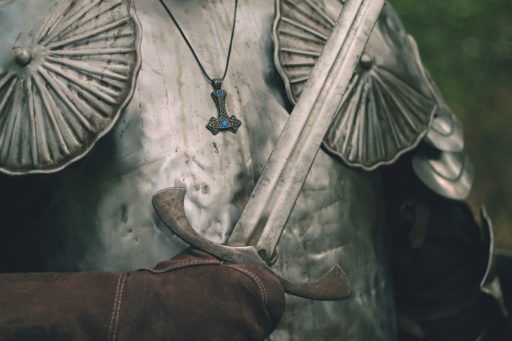Christmas is a romantic time of year. I mean it’s good for romance, the kind of story that involves cosmic questing eros—that always almost-thwarted union of generative and complementary masculine and feminine principles or energies, which reveals the mysterious nuptial nature of reality. If you want to read it this way, romance is the genre with the highest metaphysical stakes. It’s also the most fun. One of the best such stories is by the anonymous fourteenth century Englishman known as the Pearl Poet or Gawain Poet, after his two greatest works. I wrote about him once before here.
Gawain and the Green Knight begins in Christmastime, the turning of the year, historically a time of revelry and mischief. I like to read Gawain in this season, but this year I decided to watch the film The Green Knight, which came out in the summer of 2021, after observing on social media that it is apparently divisive, people either love it or hate it.
Well, I don’t hate it. I might love it, taken as a whole, but I don’t like most of it. I am indebted to personal correspondence with poet Jane Clark Scharl for getting me to think about humor in the film—or rather its humorlessness. For it is the humor of the poem that the filmmaker, David Lowery, decided to forsake, and in doing so told a different story—or perhaps I should say a story about a different Gawain.
The story of the poem, like that of the film, begins in Christmastime at King Arthur’s court. I don’t know why Lowery decided to give us an incredibly dark, grim court. There’s nothing either historical or faithful to the original story and its world in such a depiction. All interior, civilized space is cold and dark in the film. There are just two such places, clearly meant to complement each other, in the medieval poem: Arthur’s court and Bertilak’s castle in the wilds, by the Green Chapel.
In both poem and film, Gawain takes up the challenge of the Green Knight, who arrives in Arthur’s court and demands to play a game in which Arthur or his champion will render him a blow which he will return in kind one year later. Gawain accepts the challenge, strikes off the Green Knight’s head, but the Green Knight proceeds to pick it up and ride off. See you in a year, Gawain!
On his quest to find the Green Chapel and make the rendezvous, Gawain receives hospitality at a mysterious castle in the middle of nowhere. He doesn’t know that the lord of this place, Bertilak, is the Green Knight, but this will become apparent in the poem. In the film it never becomes apparent. The film makes almost nothing of Bertilak, does not even name him, and could easily have cut the entire episode at the castle. This is the decisive departure from the poem.
There is much talking in the poem. I now realize why I have all but given up on film: I can’t remember the last new film I watched that had high quality dialogue. I suppose filmmakers assume audiences cannot follow long complex speeches. This is the age of the text message and the tweet. Anyhow real dialogue seems to be reserved to stage theater and the novel, though it has diminished in the novel as well—the genre of which the great Russian critic Mikhail Bakhtin said the essence was its dialogic nature, its polyphony of speech and thought!
In Bertilak’s castle, in the poem’s version of the story, Lord Bertilak and Gawain agree to a game. This is the second game of the story, after the Green Knight’s initial offer to trade blows. (What to make of such deadly serious games—do they exist only in literature? Can only a deeply humorous culture imagine them?) Gawain will rest and recuperate for a few days before Bertilak takes him to the nearby Green Chapel in time to make the rendezvous. Meanwhile, each day Bertilak will go out hunting and give to Gawain what he gets. Gawain, who will remain in the castle with the lady of the place, will have to give the lord what he gets each day.
This game barely registers in the film, but in the poem it is lengthy. In this courtly culture, Gawain must know how to entertain a lady and her household. He must be able to tell tales and play music and converse elegantly. And so he does. He debates with the lady each day, as each day she tries to seduce him. Their conversation is artful, playful, complex. Each day Gawain goes only so far as to exchange a kiss with the lady, so when Lord Bertilak returns home he is not honor bound to do more than kiss him—a common gesture of fealty.
This is funny. It’s also suspenseful. Will Gawain be able to hold the lady off without breaking the rules of courtesy? For if he offends her, he’s doomed as assuredly as if her lord were to discover adultery. It is an instance of humor showing up in the most sophisticated kind of scene in romance, the court, but it is bodily humor. With this game, we see the root of humor in circumstance and the body. If an author portrays the characters and their world adequately, so that we can envisage them, the humor should pass down through centuries. The earnest play and merriment of the Gawain Poet’s world is as palpable to me as the sublime awkwardness and tenderness of Odysseus talking to Nausicaa and blessing her—to pick another brilliant moment that is rooted in bodily circumstance aligned along the masculine-feminine axis.
But as I say, the film isn’t after this humor at the heart of the Gawain Poet’s view of things. In the film, Gawain does go to meet the Green Knight, but he is overcome by fear. He asks the Green Knight, “Is this all there is?” To which the Green Knight replies, “What else would there be?” What follows is a long vision—it turns out to be a vision—of Gawain running away, and the tragedy that would be his fate were he to succumb to fear, a fear which seems to be born of his lack of faith that there is anything more than this world, anything which could make something like honor real and binding.
He does not run away, though. We come to the startling end of the vision and find Gawain still in the Green Chapel. He then surrenders the green girdle that the lady had given him, promising it would protect him from all wounds, and then declares he is ready for the Green Knight’s blow. We do not see what next happens.
What the film shows us throughout is a rakish Gawain at the very beginning of becoming the mature Gawain who the poem shows us in action, fulfilling his masculine role in the great quest of romance through chastity. Isn’t it strange to our sensibility that the film’s story of an earnest but feckless and unchaste Gawain should be the one to lack humor and play?
May your Christmas be merry.
Jonathan Geltner lives in Ann Arbor MI with his wife and two sons. His translation of Paul Claudel’s Five Great Odes is available from Angelico Press and a novel, Absolute Music, is available from Slant. If you enjoy his posts at Close Reading, check out his new Substack, Romance and Apocalypse, for more frequent and in-depth essays on the places where literature and other arts meet religious ideas and experience.





